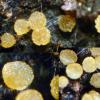
15-12-2025 07:09
 Danny Newman
Danny Newman
indet. Rutstroemiaceae sp. on unk. fallen leavesMc

15-12-2025 21:11
 Hardware Tony
Hardware Tony
Small clavate hairs, negative croziers and IKI bb

15-12-2025 15:54
 Johan Boonefaes
Johan Boonefaes
Unknown anamorph found on the ground in coastal sa

15-12-2025 15:48
 Danny Newman
Danny Newman
Melanospora cf. lagenaria on old, rotting, fallen

15-12-2025 07:05
 Danny Newman
Danny Newman
Pseudosclerococcum golindoi (det: Zotto)near Cosb

15-12-2025 11:49
 Danny Newman
Danny Newman
ITS sequences from the following two collections B

15-12-2025 12:34
 Danny Newman
Danny Newman
indet. Rhytismataceae on oak leafnear Purchase Roa

09-12-2025 12:06
 Andgelo Mombert
Andgelo Mombert
Bonjour,Je recherche l'article concernant Hypobryo
Coprotus...ochraceus?
Björn Wergen,
04-04-2011 02:11
 Hi again,
Hi again,the findings of the last days will be microscoped again, but first I have some problems with Coprotus. 2005 I had found some of Coprotus but was not really able to determine them. Now, with more literature and more experience, I hoped to be ready for Coprotus, but it seems as if I am wrong with it.
Fruitbody 0,5-1 mm, disc-shaped, whitish to yellow-whitish, with protuding asci. Spores 17-21x10-12,5 µm, ellipsoid, hyaline, really smooth, with deBarry-Bubble (I hope it is right), thickwalled. Asci 90-100x20-30 µm, cylindrical, with 8 spores in different arrangement, Spores in Asci with gel-sheath (similar to immature Ascobolus immersus spores...). Paraphyses cylindrical, 90-100x2-3 µm, apices up to 7 µm, hyalin, septate, rarely branched.
On dung of wild pig.
Perhaps someone has an idea. My problem is the spore size, C. ochraceus and C. leucopocillum with both 8spored asci have smaller spores...
regards,
Kazuya
Michel Delpont,
04-04-2011 11:56

Re:Coprotus...ochraceus?
hello.
Coprotus species of the genus are often difficult to separate. The size of the spores seem a little large for leucopocillum. Ochraceus is normally more pigmented than leucopocillum, bigger in size, and has also more pigmented paraphyses. The exipulum is also normally low cyanophilous.
Regards.
Coprotus species of the genus are often difficult to separate. The size of the spores seem a little large for leucopocillum. Ochraceus is normally more pigmented than leucopocillum, bigger in size, and has also more pigmented paraphyses. The exipulum is also normally low cyanophilous.
Regards.
Björn Wergen,
04-04-2011 21:09

Re:Coprotus...ochraceus?
Hi Michel,
thank you for the answer. I checked another substrate, also wild pig, and found more orange-yellow to pale ochraceous-yellow apothecia in the same size as the finding before, but different microscopical features like the smaller spores (17-19x10-11µm) and not inflated paraphyses with pale yellow pigment. I will show the photos right here ;)
I think this should be C. ochraceus.
regards,
Kazuya
--------------
edit: Asci open by an operculum!
thank you for the answer. I checked another substrate, also wild pig, and found more orange-yellow to pale ochraceous-yellow apothecia in the same size as the finding before, but different microscopical features like the smaller spores (17-19x10-11µm) and not inflated paraphyses with pale yellow pigment. I will show the photos right here ;)
I think this should be C. ochraceus.
regards,
Kazuya
--------------
edit: Asci open by an operculum!
Michel Delpont,
09-04-2011 14:28

Re:Coprotus...ochraceus?
OK, this seems to fit; excuse my delay but I had a computer problem.
Regards.
Regards.
Björn Wergen,
10-04-2011 17:08

Re:Coprotus...ochraceus?
Hi Michel,
many thanks for your opinion, it does not matter if it was a bit late ;)
regards,
Kazuya
many thanks for your opinion, it does not matter if it was a bit late ;)
regards,
Kazuya



